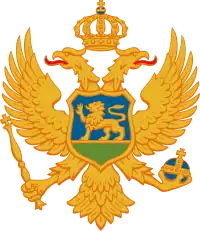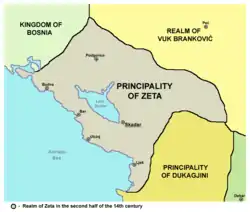List of princes of Zeta
This is a list of princes of Zeta.
| History of Montenegro |
|---|
 |
| Prehistory |
| Middle Ages and early modern |
| Modern and contemporary |
| Topics |
Background
After Constantin Bodin's death, fighting among his potential successors weakened the state of Duklja and the region succumbed to Rascia's reign between 1183 and 1186.
In 1190, Grand Župan of Rascia Stefan Nemanja's son, Vukan II, asserted his right to the Dukljan crown. In 1219, the regent of Zeta and King Vukan's oldest son, Đorđe Nemanjić, became king of Duklja/Zeta. He was succeeded by his second oldest son, Uroš I, who built the 'Uspenje Bogorodice' monastery in Morača.
Between 1276 and 1309, Zeta was ruled by Queen Jelena, widow of Serbia's King Uroš I. She restored around 50 monasteries in the region--- most notably Saint Srđ and Vakh on the Bojana River. The name Crna Gora (Montenegro) was formally mentioned for the first time in 1296, in the charter of St. Nicholas' monastery in Vranjina. This charter was issued by the Serbian King Stefan Milutin Nemanjić, who was the youngest son of Uroš I and Helen of Anjou. Crna Gora (Montenegro) was to be understood as the highland region under Mount Lovćen, within the confines of Zeta. By the beginning of the 14th century, during King Milutin's reign, the Archdiocese in Bar was the strongest feudal lord in Zeta.
From 1309 to 1321, Zeta was co-ruled by the oldest son of King Milutin, Young King Stefan Uroš III Dečanski. Similarly, from 1321 to 1331, Stefan's young son Stefan Dušan Uroš IV Nemanjić, the future Serbian King and Tsar, co-ruled Zeta with his father.
After Tsar Dušan's death in 1355, the Serbian state Kingdom started to crumble and its holdings were divided among Prince (Knjaz) Lazar Hrebeljanović, the short-lived (1353–1391) Bosnian state of Tvrtko I Kotromanić, and a semi-independent chiefdom of Zeta under the House of Balšić, whose founder Balša I came to power in 1356.
Zeta

The Principality of Zeta (Montenegrin and Serbian: Кнежевина Зета, romanized: Kneževina Zeta) is a historiographical name for a late medieval South Slavic principality located in the southern parts of modern Montenegro and northern parts of modern Albania, around the Lake of Skadar. It was ruled by the Serbian families of Balšić, Lazarević, Branković and Crnojević in succession from the second half of the 14th century until Ottoman conquest at the very end of the 15th century. Previously, the same region of Zeta was a Serbian crown land, that had become independent after the fall of the Serbian Empire, when the Balšić family created a regional principality, sometime after 1360.[1]
The region of Zeta was a part of the Serbian Empire reigned by the House of Nemanjić. In the mid-14th century in the Lower Zeta region, a minor nobility family known as the House of Balšić comes to prominence (during the reign of Tsar Dušan; ca. 1360 they have become one of the major nobility groups within the Empire, recognized as such local lords of Zeta under Tsar Uroš. The Serbian Empire becomes ever-fragmented as local lords become acting ever-more independently, the Balsics included; after the Battle of Marica in 1371 emperor Uroš dies and no one succeeds him at the Throne.
In 1421 the Balšić family is succeeded by the House of Lazarević.
House of Balšić
The Balšić family members all had their own lands which they held collectively, but they were at various times presided by a Head of the Family:
House of Lazarević
- Despot Stefan Lazarević (1421–1427)
House of Branković
In 1427 the Serbian despot died and the throne through adoptive lineage passes on to the House of Branković, according to the treaty; they inherit the Zetan territories. The Lazarevic and Brankovic houses use the legitimate right they had succeeded from the Balsics in order to claim supremacy over the Crnojevic house as well, in the Upper Zeta region (Montenegro proper).
In 1456 the last Serbian bastion in Zeta, the fortifications of Medun, are conquered by the Ottoman forces of Sultan Mehmed the Conqueror.
- Despot Đurađ Branković (1427–1456)
House of Crnojević
The House of Crnojević was a dynasty ruling in the Medieval state of Zeta, first struggling with House of Balšić for control over Zeta, and then succeeding them as Zeta's supreme overlords throughout the 14th and 15th century. Since the second half of the 15th century, they would play a crucial role in the survival of late Medieval Zeta. All members of the House of Crnojević considered themselves Lords Zetan.
| Name | Reign | Territory | Notes |
|---|---|---|---|
| Radič | end of the 14th century–1396 | Zeta | |
| Đurađ Đurašević and Aleksa Đurašević | 1403–1435 | Zeta | Ruled as vassals of the Venetians |
| Gojčin (Gojčin, Goycinus) | 1435–1451 | Zeta | Ruled under Đurađ Branković (Serbian Despotate) |
| Stefan I | 1451–1465 | Zeta | Ruled under the Despotate 1451–1452, then under Venetian rule |
| Ivan I | 1465–1490 | Zeta | |
| Đurađ IV | 1490–1496 | Zeta | |
| Stefan II | 1496–1499 | Zeta |
See also
References
- Ćirković 2004, p. 77.
Sources
- Bataković, Dušan T., ed. (2005). Histoire du peuple serbe [History of the Serbian People] (in French). Lausanne: L’Age d’Homme. ISBN 9782825119587.
- Ćirković, Sima (2004). The Serbs. Malden: Blackwell Publishing. ISBN 9781405142915.
- Fine, John V. A. Jr. (1994) [1987]. The Late Medieval Balkans: A Critical Survey from the Late Twelfth Century to the Ottoman Conquest. Ann Arbor, Michigan: University of Michigan Press. ISBN 0-472-08260-4.
- Ivić, Pavle, ed. (1995). The History of Serbian Culture. Edgware: Porthill Publishers. ISBN 9781870732314.
- Orbini, Mauro (1601). Il Regno de gli Slavi hoggi corrottamente detti Schiavoni. Pesaro: Apresso Girolamo Concordia.
- Орбин, Мавро (1968). Краљевство Словена. Београд: Српска књижевна задруга.
- Samardžić, Radovan; Duškov, Milan, eds. (1993). Serbs in European Civilization. Belgrade: Nova, Serbian Academy of Sciences and Arts, Institute for Balkan Studies. ISBN 9788675830153.